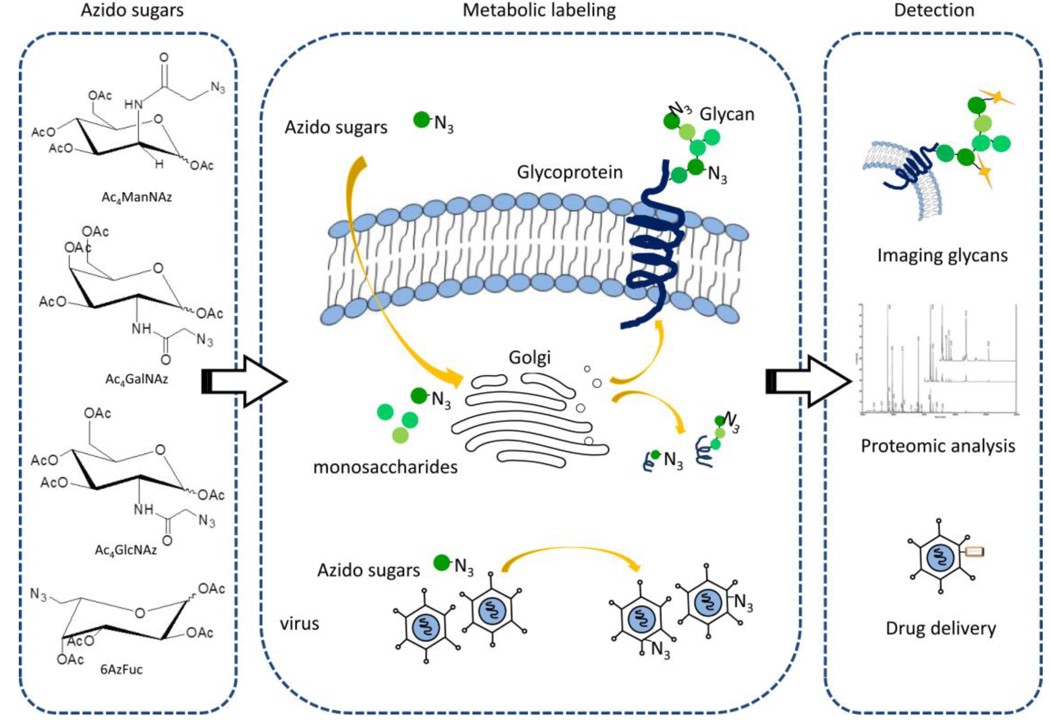Unnatural Glycan Based Bacteria Conjugation Service
The use of unnatural glycan as chemical tags to label cell membranes and targeted deliver molecular cargo provides a powerful tool for metabolic glycoengineering, which has been widely used for labeling and targeting studies of various types of cells. Creative Biolabs provides custom unnatural glycan-based bacteria conjugation services for clients all over the world to meet our customers' different purposes.
Metabolic Glycoengineering for Unnatural Glycan
After chemically tagged unnatural monosaccharides enter cells or bacteria, they are processed through metabolic glycoengineering pathways, bound to proteins, and expressed in the form of glycoproteins on the cell membrane. These chemical tags expressed on the cell surface can be modified, metabolic labeling or targeted delivery of molecules of interest by various chemical methods. Monosaccharides commonly used in metabolic glycoengineering within bacteria include N-acetylgalactosamine, fucose, N-acetylneuraminic acid, mannose, etc. Different glycans are produced by different pathways, among which GDP-fucose is produced mainly through two pathways in bacteria, one is called de novo pathway, in which GDP-fucose is generated from mannose via mannose dehydratase and fucose synthase. The other is the salvage pathway, where fucose is initially phosphorylated by fucose kinase and then converted to GDP-fucose by GDP-fucose pyrophosphorylase. Inside Escherichia coli, if the natural de novo synthesis pathway is disrupted by means such as gene editing, the salvage pathway can be relied on to complete the highly uniform modification of cell surface polysaccharides.
 Fig.1 Different types of unnatural monosaccharides residues can incorporate into glycoconjugates through cells’ or virus’ own biosynthetic machinery.1
Fig.1 Different types of unnatural monosaccharides residues can incorporate into glycoconjugates through cells’ or virus’ own biosynthetic machinery.1
Unnatural Glycan-Based Bacteria Conjugation Services
The most versatile and feasible functional group for modification in living cells is azide, which can be selectively chemically conjugated with functionalized phosphine or alkyne under physiological conditions, and has certain stability and applicability. In addition to this, various other types of chemical tags can also be introduced into the cell membrane through metabolic labels, including alkynes, ketones, amines, and hydroxythiols. These modified sites can react with fluorescein-conjugated reagents in different catalytic systems, and can be observed intuitively by fluorescence microscopy. Glycans on the surface of bacteria can also be attached to hydroxyl or other functional groups of another biomolecule through an enzymatic reaction, a process called glycosylation. Glycans can be attached to the amide nitrogen of an asparagine residue, or to the hydroxyl oxygen of serine/threonine.
Our Services
The manipulation of glycans in gut microbes or other eukaryotic cells has been extensively researched. In addition to being widely used in bacterial surface labeling and cell interaction studies, it is also considered a powerful tool for vaccine development. Years of experience have rewarded Creative Biolabs with a professional and comprehensive technology platform to provide custom unnatural glycan-based bacteria conjugation services. We provide stable and reliable synthesis, modification and fluorescent labeling services for monosaccharides and glycans commonly found in organisms from bacteria to humans. The plan is to choose, provide and customized edit a range of microbes with well-characterized surface glycan structures, including E. coli. We will be honored to communicate with you and develop a personalized experiment and development plan according to your needs. Please feel free to contact us for more information.
Reference
-
Zhang, Xiu, and Yan Zhang. "Applications of azide-based bioorthogonal click chemistry in glycobiology." Molecules 18.6 (2013): 7145-7159.
under Open Access license CC BY 3.0, without modification.
Recommended products
